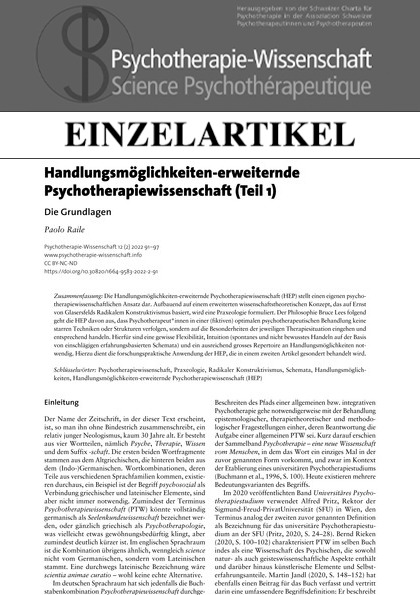Action-possibility-expanding psychotherapy science (Part 1)
Basics
DOI:
https://doi.org/10.30820/1664-9583-2022-2-91Keywords:
Psychotherapy science, praxeology, radical constructivism, schemas, possibilities for action, action-possibility-expanding psychotherapy science (HEP)Abstract
The action-possibility-expanding psychotherapy science (HEP) represents a separate psychotherapy science approach. Building on an extended concept of scientific theory based on Ernst von Glasersfeld’s radical constructivism, a praxeology is formulated. Following Bruce Lee’s philosophy, HEP assumes that psychotherapists do not follow rigid techniques or structures in a (fictitious) optimal psychotherapeutic treatment but respond to the specifics of each therapy situation and act accordingly. For this, a certain flexibility, intuition (spontaneous and not conscious acting on the basis of relevant experience-based schemata) and a sufficiently large repertoire of possible actions are necessary. For this purpose, the research-practical application of HEP serves, which will be treated separately in a second article.
Downloads
How to Cite
Raile, P. (2022). Action-possibility-expanding psychotherapy science (Part 1): Basics. Psychotherapie-Wissenschaft, 12(2), 91–97. https://doi.org/10.30820/1664-9583-2022-2-91
Issue
Section
Original Work
License

This work is licensed under a Creative Commons Attribution-NonCommercial-NoDerivatives 3.0 Unported License.
This journal provides open access to its content in accordance with the basic premise that the free public availability of research benefits the exchange of knowledge throughout the world.
Authors wishing to publish in this journal agree to the following:
- The author/s retain/s the copyrights and consent/s to initial publication of the work in the journal under a Creative Commons Attribution licence, which allows third parties to use the work by citing the name/s of the author/s and this journal as initial publisher (in accordance with the Creative Commons Attribution-NonCommercial-NoDerivs 3.0 DE-Licence).
- The author/s can enter into additional contracts for the non-exclusive distribution (e.g. publish in a collection or book) of the version published in the journal, if the journal is cited as initial publisher.


